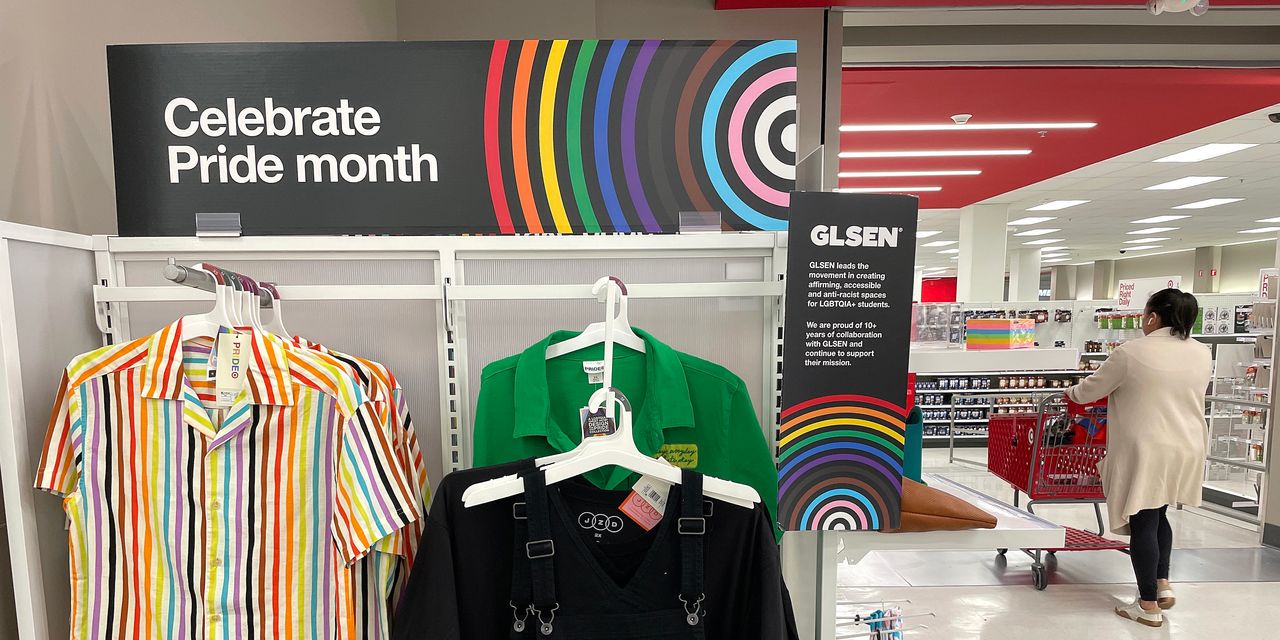With heightened anti-LGBTQ+ sentiment in the U.S. and hundreds of bills that would negatively affect LGBTQ+ rights introduced in the 2023 legislative session, some consumers who want to align their spending and investing with their values might find it trickier than ever to do so.
That’s because many companies that have declared support for LGBTQ+ people continue their typical practice of donating to politicians on both sides of the aisle — even as some of those politicians work to roll back LGBTQ+ rights.
From the archives (June 2022): AT&T, Charter Communications, GM and more donated to politicians backing anti-LGBTQ laws — and are now loudly celebrating Pride Month
A survey by Charles Schwab
SCHW,
last year found that three-fourths of American consumers cared about the values of the companies whose products they buy, and 81% said corporate values influence their investing decisions.
But Americus Reed, a professor of marketing at the University of Pennsylvania’s Wharton School who studies how social factors influence consumer behavior, said it’s “easy for people to report” that certain issues are important to them.
“When the rubber meets the road, will you boycott? Will you ‘buycott’? Will you inconvenience yourself?” he asked.
‘That data is actually out there’
Consumers could put real pressure on companies, said Fabrice Houdart, the executive director of the Association of LGBTQ+ Corporate Directors and a consultant to Fortune 500 companies. “My grandmother used to tell me that if consumers in the world would unite, they could change anything,” he said.
Houdart added, though, that many consumers’ lack of information — and a lack of transparency by companies about their political donations, alongside highly publicized corporate donations to LGBTQ+ advocacy groups — all make it “difficult to know who is the good guy and the bad guy.” In addition, he and others said, companies can have a great track record on LGBTQ+ rights but fall short in other areas.
Reed insisted that consumers who really care about a cause can do the work: “That data is actually out there. The Google machine can help.”
“Purpose-driven marketing” is here to stay, Reed added, and it will be up to consumers to figure out whether they think companies are being genuine. Consumers may want to ask more questions and treat this “as a true scholarly exercise,” he said. “You might want to do more than just look at a list or index.”
Concerned consumers also can turn to groups, websites and apps that track or rank companies’ support for LGBTQ+ people, such as the Real Allies Database, a website operated by the watchdog group Accountable for Equality Action, or the prominent advocacy groups GLAAD and the Human Rights Campaign (HRC).
There are complicating factors, though. As the Popular Information newsletter recently pointed out, HRC’s Corporate Equality Index excludes political donations, so some companies the group awarded high ratings to for their LGBTQ+ support actually gave money to politicians backing anti-LGBTQ+ legislation.
In a recent blog post, the Human Rights Campaign said it was tracking legislation that bans gender-affirming care, anti-transgender bathroom bills, anti-LGBTQ+ curriculum-censorship bills and drag-performance bans.
HRC also said it had suspended Anheuser-Busch’s
BUD,
score on its equality index because of the company’s noncommittal response to the transphobic backlash against social-media influencer Dylan Mulvaney, who was featured in a Bud Light promotion. And the group criticized Target
TGT,
for moving Pride Month merchandise to the back of some stores in Southern states after backlash and what the company said were threats to its workers’ safety.
See also: Human Rights Campaign declares state-of-emergency warning for LGBTQ+ Americans
Houdart is critical of the big LGBTQ+ advocacy groups, saying they have been influenced by corporate donations throughout the years: “If we really want to take a stance, we could just start by not inviting [these companies], not giving them a floor at events or giving them high scores on indexes.”
The Human Rights Campaign did not return MarketWatch’s requests for additional comment.
A GLAAD spokesperson told MarketWatch that “if you research a bit about GLAAD’s work to hold corporates accountable on LGBTQ issues, the truth is obvious and the list of times we have publicly or privately advocated for LGBTQ inclusion or reversal of an anti-LGBTQ action is long.”
The spokesperson said that includes calling out corporations that donate to the group, such as through GLAAD’s reports on film studios and their political donations, as well as creating a recently released index on social-media safety.
‘It’s hard for me to be perfect’
Another issue is that some companies might support LGBTQ+ rights but have a poor record on other important issues consumers care about. “Fast fashion has been pro-LGBTQ, though it’s terrible on the environment,” Houdart said, adding that other companies and industries fall into the same category.
Frank Russell, a college professor who lives in Fullerton, Calif., with his husband, feels the same way. He said he tries to consume and invest “in a way that I can feel good about, [but] I also find it’s hard for me to be perfect about that.”
“Although my identity as a gay man is important to me … as much as possible, I don’t want to spend or invest money in companies that are making climate change worse,” Russell said.
Because he doesn’t have time to track individual stocks to invest in, Russell said, he relies on index investing, and thinks “the Nasdaq 100
NDX,
is general in better in terms of being consistent with my values vs. the S&P 500
SPX,
”
As an example, he compared tech giant Apple
AAPL,
which happens to be in both indexes, with oil giant Exxon Mobil
XOM,
which is in the S&P 500 index. “Apple is not perfect, but it behaves in a way that’s more consistent with my values than Exxon Mobil does,” Russell said.
Read next: Starbucks workers at more than 150 stores plan to strike as tensions build over Pride decorations
Read the full article here


